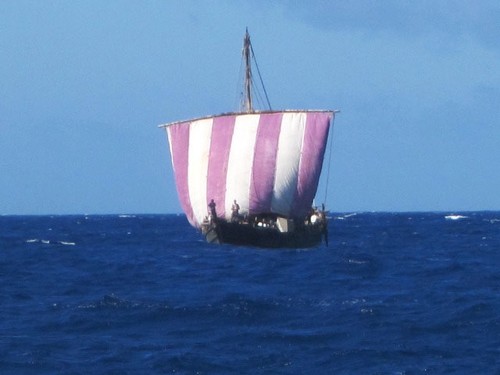Phoenicia, 600BC ship replica - successfully to Gibraltar
by Nancy Knudsen on 3 Sep 2010

Phoenicia under sail in the Atlantic - photo by Rachel Severson of yacht Sophia SW
After 27 days at sea since departing the Azores, Phoenicia, the replica of a 600BC Phoenician vessel which it is believed circumnavigated Africa in her day, has been experiencing a warm welcome from the local media, staff and public at Ocean Village Marina, Gibraltar.
Phoenicia arrived on the afternoon of last Sunday (29th August). Whilst in Gibraltar Phoenicia was lucky enough to be supported and hosted by Ocean Village Marina, a fantastic base for the expedition for their short stay.
Expedition Leader Philip Beale and the 10 international crew members have been enjoying an eventful stay in port while also re-stocking the ship with fresh supplies, welcoming new crew onboard and a days filming with the BBC before setting off to continue the expedition across the Mediterranean.
This is just one part of a voyage that began in Syria in August 2008. Phoenicia then sailed through the Suez Canal before reaching the Republic of Yemen at the foot of the Red Sea in January 2009. Phase two began in August 2009 when she was launched once more to continue around the Horn of Africa, down the east coast, passing through the challenging Cape of Good Hope and back up the west coast en route to the Straits of Gibraltar.
In the original voyage, in 600BC, it is thought that the crew had to remain in some areas and plant crops, then wait for them to mature to restock their vessel before continuing.
After five days in Ocean Village marina, where the crew have relished the British pints and a good stocking-up of Morrison's, Phoenicia is about to cross the Mediterranean before returning to Syria once more. And at the end of the circumnavigation Phoenicia will have clocked up 17,000 miles.
More about the Phoenicia Expedition:
Over two and a half thousand years ago one of the greatest journeys in mankind's history began on the Egyptian shores of the Red Sea. Greek Historian Herodotus tells us how, in 600 BC, Phoenician mariners achieved the first circumnavigation of Africa, a voyage into unknown waters previously considered too dangerous to attempt.
In 2008-2010 a reconstruction of a Phoenician / Mediterranean trading vessel, built at the ancient Phoenician port of Arwad, embarked on a journey to re-trace the Phoenicians' route around Africa. Re-creating this historical voyage is the major objective of the Phoenician Ship Expedition.
After sailing back to the home port of Arwad, the circumnavigation will be followed by another voyage to bring the ship to the United Kingdom, where it will be exhibited in a British Museum.
For more information on Phoenicia including a live satellite tracking device visit www.phoenicia.org.uk
If you want to link to this article then please use this URL: www.sail-world.com/74230